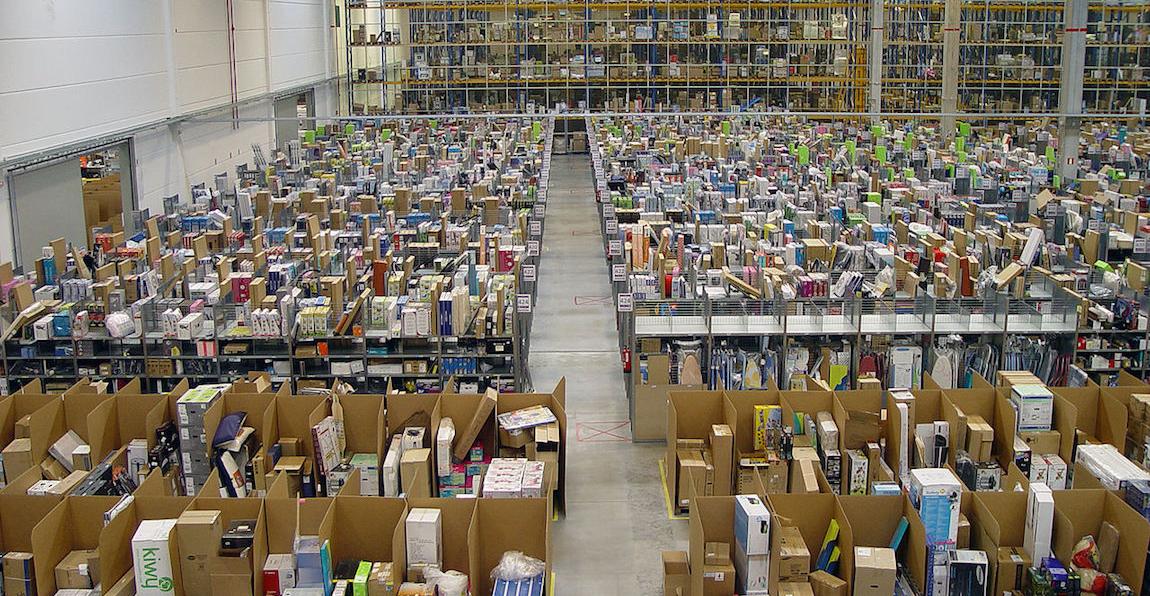
Amazon Making People Pee In Bottles Isn't The First Time They've Mistreated Workers
03/25/21 update: On Thursday, Wisconsin Congressman Mark Pocan called out Amazon executive David Clark for claiming Amazon was "the Bernie Sanders of employers," telling him that paying workers $15 an hour didn't make them a "progressive workplace" when they were forcing their workers to urinate in water bottles. Amazon's official news account tweeted back at Pocan denying his claim.
Despite the company's denial, this practice has been widely documented.
This article was originally published in 2018.
Amazon is allegedly making warehouse employees pee in bottles, and unfortunately, it's not that surprising. The new accusation comes from author James Bloodworth, who went undercover at an Amazon warehouse in the UK. Bloodworth told The Sun that some workers were forced to walk the entire 700,000 square foot warehouse (a quarter mile, 10-minute walk) to get to two bathrooms that served the entire four-story, 1,200-employee workplace.
Bloodworth claims that he was required to walk 10 miles every day in the job, and that "time wasting" was constantly monitored.
As a result, Bloodworth says, "people just peed in bottles because they lived in fear of being disciplined over 'idle time' and losing their jobs just because they needed the loo."
The report should be shocking — exposing a company so focused on profits that it's thrown basic necessities and dignities out the window — but unfortunately, it's just the way things are these days, particularly at Amazon. Here's a rundown of complaints lodged against Amazon's workplace conditions over the years:
Employees Are Afraid To Take Bathroom Breaks
A separate survey released Sunday by labor group Organise found that 74% of 102 fulfillment employees surveyed avoided using the bathroom to prevent disciplinary action. Most said they were concerned about missing increasingly high targets. 55% said they have suffered from depression since starting their work at Amazon, and 57% said they've been more anxious.
Another undercover report in The Mirror by Alan Selby documents disturbing conditions in fulfillment centers — workers were asked to stand for the entirety of their 10-hour shifts, except for two 30-minute breaks. Bathroom breaks were automatically timed by work stations. Selby says he witnessed someone collapse and saw another have a panic attack after learning they would have to work a 55-hour week during Christmas.
Unsafe Conditions
Aside from sheer exhaustion and a lack of bathroom breaks, employees have reported intimidation in the face of injury, and simply dangerous conditions at warehouses. Multiple employees told The Seattle Times in 2012 that they were encouraged to not seek outside medical attention when injured, or attribute injuries to pre-existing conditions, to prevent reports to OSHA. Others said that injured employees were often pushed out or fired.
Multiple warehouses have been reported to have issues with temperature. At one warehouse in Pennsylvania, it was reported by The Morning Call that temperatures would exceed 100 degrees, causing employees to repeatedly pass out or become dizzy. Amazon reportedly arranged for ambulances to park outside to drive fallen employees to the hospital.
On the other end of the spectrum, one employee told Gawker that during the winter rush, his warehouse temperature would drop to below freezing as every door and port were opened to facilitate shipping demand.
It's Just A Gig
In the US, Amazon is said to frequently rely on staffing agencies who provide temporary work to keep costs down, isolate themselves from liability and prevent workers unions.
Similarly, Amazon hires temporary package deliverers through its Flex program — people who are at least partially relying on Amazon for money, but to whom Amazon owes almost nothing. A Gizmodo report from last year documents that Flex drivers who have been with the company for years are still classified as "independent contractors," potentially violating labor laws. Additionally, workers have reported problems like random termination, unpredictable scheduling, and an inconsistent payment system.
Other drivers have complained that Amazon's brutal standards have been imposed on drivers, who are being asked to drive over 11 hours per day, not accounting for bathroom breaks. Drivers reportedly also frequently urinate in bottles because of this problem, with it becoming so frequent that Amazon sent an email asking drivers to stop. Last year, Amazon drivers were caught urinating and defecating on delivery routes, much to the mockery of the media despite persistent reports of a culture that doesn't allow for bathroom breaks.
A Culture Of Work
In 2015, The New York Times documented a company ethos of relentless self-improvement and work in the white-collar jobs of Amazon — with employees reportedly staying awake for four days straight, working 85-hour weeks, and taking few vacations. Relentless work is encouraged by a persistent and panoptic ranking system, which results in an annual cull of the lowest ranking employees.
Multiple employees told The Times that they were given poor performance reviews or put on probation after battles with cancer or failed pregnancies.
